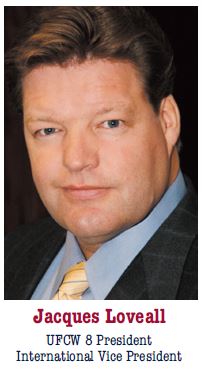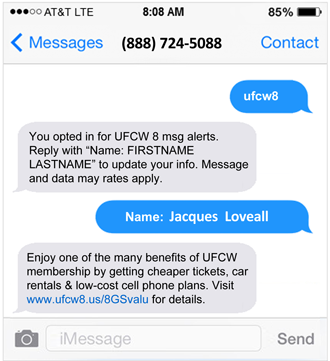
Protecting workers’ rights, and guaranteeing benefits are top priorities
UFCW 8-Golden State has joined the leadership of the United Food and Commercial Workers International Union in calling on the federal government to reject the proposed merger between Albertsons Companies Inc. and the Kroger Family of Companies.
Kroger owns Ralphs, Foods Co and Food 4 Less in California, among others, while Albertsons owns Safeway, Vons and Pavilions in the state, among other chains.
At issue are the deal’s potential threats to the wages, benefits and working conditions of Union workers in the supermarket industry.
During a meeting with Kroger and Albertsons management and UFCW Local Unions across the country, UFCW 8 President Jacques Loveall identified two critical issues relating to the merger: Union job security and protection of health care and pension plans.
“Our Union would be open to potentially supporting a merger if the workers were sufficiently protected,” President Loveall said.
“For example, if any stores are divested, they should be sold to Union companies which would recognize our current health care and pension plans. Additionally, these benefit plans need to be fully funded and the rights of workers at Albertsons and Kroger who are not yet represented by the UFCW need to be recognized.”
‘Lack of transparency’
Speaking at the UFCW’s recent 9th Regular Convention, International President Marc Perrone said the Union conducted a deep analysis of the merger’s potential ramifications before announcing its position.
“Given the lack of transparency and the impact a merger between two of the largest supermarket companies could have on essential workers and the communities and customers they serve, the UFCW stands united in its opposition to the proposed Kroger and Albertsons merger,” Perrone said.
The proposed merger could cost American workers more than $300 million annually due to store closures and reduced Union bargaining power, according to an alysis released by the Economic Policy Institute.
The report supports the position taken by a growing “Stop the Merger” coalition which includes the UFCW, the Teamsters, the American Postal Workers Union, the Center for Science in the Public Interest, Public Citizen, the National Organization for Women and scores of other organizations and individuals.
The merger between Albertsons and Kroger was announced in 2022, but the Federal Trade Commission (FTC), which is charged with looking into the proposal, may not have a ruling on whether it may proceed until later this year or perhaps in 2024.
If approved, the merger would make the combined entity the largest retailer in the United States with nearly 5,000 stores, more than 700,000 employees and nearly 4,000 pharmacies.
“The regulatory hurdles are significant, so there’s a chance the regulators in Washington, D.C., won’t allow it to go through,” said Loveall, who was elected No. 1 International Vice President at the UFCW convention.
Loveall noted the current administration in Washington, D.C., is more concerned than the previous administration was about concentrating too much marketing power in a single company.
“Last year, the Federal Trade Commission sued to block six big mergers,” he said. “It compelled Lockheed Martin Corp. to abandon its acquisition of Aerojet Rocketdyne Holdings Inc. and forced Nvidia Corp., a major manufacturer of computer chips, to abandon its purchase of Britain’s Arm Ltd., a major designer of semiconductors.”
Higher prices for consumers
While Kroger and Albertsons, already the country’s two largest supermarket conglomerates, insist grocery prices would go down due to efficiencies of scale, the opposite result is more likely, President Loveall said.
“Any person with an understanding of economics would understand that reduced competition would mean higher prices for consumers,” he said.
“What’s more,” he continued, “we remember all too well what happened when Albertsons acquired Safeway back in 2014. To appease federal regulators, the merged company sold 146 Albertsons, Pavilions and Safeway stores to a small Northwestern chain called Haggen. While Haggen was a well-meaning Union employer, it botched the expansion and was forced to declare bankruptcy within a year, causing thousands of workers to lose their good Union jobs.”
“The UFCW refuses to stand by and let history repeat itself,” President Loveall continued.
“We urge the Federal Trade Commission, as well as state and federal legislative bodies, to take action to block this merger as it stands, which could affect future Union contracts and jobs throughout the industry.”


